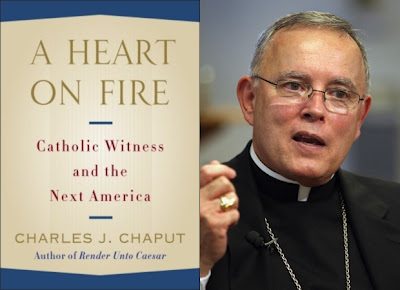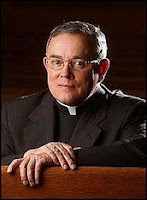If you haven’t purchased Heart on Fire yet, get your copy now for just $0.99 on either Kindle or Nook. You don’t even have to own an e-reader since you can download free apps from Amazon that allow you to read eBooks on your computer, phone, or tablet.
Also, as a reminder, this Friday’s giveaway will feature three digital copies of A Heart on Fire so be sure to come back and enter!
On Monday I reviewed Archbishop Charles Chaput’s new eBook titled A Heart of Fire: Catholic Witness and the Next America. The book is a short manifesto on religious liberty which calls all Catholics to take their faith into the public square. Here’s what I said:
“With the recent HHS mandate, proposals to redefine marriage, and the government deciding what constitutes religious practice, our country is at a critical tipping point. Which makes Archbishop Chaput’s book so apropos. Though succinct, its timeliness, clarity, and prophetic nature make it one of this year’s most important texts.”
Archbishop Chaput recently sat down with me to talk about his recent eBook, religious liberty, and what Catholics can do to support this freedom. Read the interview below:
Q: In your new book, A Heart on Fire, you begin by exploring the character of modern journalism. You describe it as harboring a sort of Orwellian “new orthodoxy.” What do you mean by this “new orthodoxy” and why is it so dangerous?
The mass media form us as well as inform us. That’s power. In effect, they’re a kind of “catechetical syndicate.” The most obvious example is the laff track on television sitcoms. It tells us when something is supposed to be funny, and we’re authorized to laugh. But every reporter, editor and headline writer does something subtly similar in the way he or she presents an issue. Some information or opinion is always highlighted. Other pieces of information or opinions are left out or shortchanged.
Honest journalists understand this and try to prevent their personal opinions from shaping news content. But it’s hard work. And too many journalists no longer seem to grasp, or care, how their personal advocacy or ignorance on a subject can compromise their duty to fully report the facts.
Every profession has its basic instincts and appetites. For journalists, the instincts are curiosity and skepticism. The appetite is for bringing about change. Traditional religious faith is “un-modern.” It places annoying burdens on our social and personal behavior. It’s too often lived in a hypocritical way. So it’s a natural target.
The new kind of orthodoxy that pervades our mass media involves a range of attitudes toward religion—from indifference to distrust to disdain, much of them rooted in the politics of sexuality. This is dangerous because pulling down a moral framework is always easier than building one up.
Q: Today, nearly 70% of the world’s people live in nations where religious freedom is gravely restricted, and it’s happening here at home, as well. In your book you say, “The America emerging in the next several decades is likely to be much less friendly to Christian faith than anything in our country’s past. And that poses a challenge for all of us as Catholics. It’s not a question of when or if it might happen. It’s happening today.” Why this growing trend to push religion out of the public sphere?
Religion is inconvenient because of its implications. People who really believe in God act on their beliefs, not just in their personal lives but also in their public witness.
Christianity has very clear teachings about the nature of human dignity, rights, obligations and sexuality, and the purpose of human society. These teachings can be unpopular. That makes Christians and other serious religious believers a problem for a lot of modern rulers, including the democratically elected kind.
Q: Interestingly, you explain how the loss of a culture’s religious grounding can quickly lead to individualism. You say that “without the restraints of a moral consensus, animated and defended by a living religious community, the freedom of the individual easily becomes a license for selfishness. The meaning of right and wrong becomes privatized.” Why is religion so central to the fabric of a healthy society?
Religious faith, lived genuinely, is a school for humility and charity. No community can exist for long without these two virtues animating its members.
A healthy society is much more than a collection of sovereign individuals. We have obligations to each other. Religious faith provides the higher purpose to our common life. It also gives us the reason for our mutual rights and obligations. Each of our lives is sacred because we each are made and loved by the same God.
Q: You and every other bishop have spoken out against the recent HHS mandate, which is a grave assault on religious liberty. What can Catholics in the pew do to help promote religious freedom?
There’s really no substitute for writing and calling your senators and congressman—again, and again, and again; and getting other good people to do the same. It works.
Q: If you could have the modern American Catholic read three books, what would they be and why?
The Gospel of Luke, the Epistle of James and, in the Old Testament, Jeremiah. I could name so many others—from C.S. Lewis to Daniel Boorstin to Neil Postman to Christopher Lasch to John Courtney Murray—some of them not religious at all, but still very useful for understanding the terrain of our age.
But the Word of God and a love for the Eucharist: These things above everything else should be the anchor of our lives.
For more from Archbishop Chaput, be sure to follow his weekly newspaper column, latest homilies, and very active Facebook page.
And if you liked this discussion, check out my other interviews with people like Fr. Robert Barron, Christopher West, Bishop Christopher Coyne, Marc Barnes, and more. Also, be sure you don’t miss future interviews by subscribing to The Thin Veil via feed reader or email.
How do you live your faith in the public square?
If you haven’t purchased Heart on Fire yet, get your copy now for just $0.99 on either Kindle or Nook. Also, as a reminder, this Friday’s giveaway will feature three digital copies of A Heart on Fire so be sure to come back and enter!


